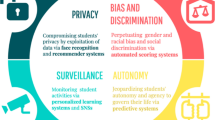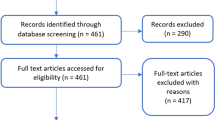Abstract
One of the open questions in Educational robots is the role a robot should take in the classroom. The current focus in this area is on employing robots as a tool or in an assistive capacity such as the invigilator of an exam. With robots becoming commonplace in the classroom, inquiries will be raised regarding not only their suitability but also their ability to influence and control the morality and behaviour of the students via their presence. Therefore, as a means to test this cross-section of Educational robots with the underlying issue of morality and ethics we conducted an empirical study where the Nao robot invigilated an exam for a group of students. A between-subjects design (N = 56, 14 groups of 4 students) compared whether Nao was able to deter students from cheating and maintaining their discipline in comparison to a human invigilator or when there was no invigilator present. Our results showed that while explicit cheating rarely took place across all conditions, the students were significantly more talkative when they were invigilated by Nao. In conclusion, we discuss and speculate upon some of the ensuing implications towards not only the application of robots in education but also consequently the wider issue of the preservation of morality and ethics in a classroom in the presence of an agent.


Similar content being viewed by others
References
Ahmad MI, Mubin O, Orlando J (2016) Understanding behaviours and roles for social and adaptive robots in education: teacher's perspective. In: Proceedings of the fourth international conference on human agent interaction. pp 297–304
Ahmad M, Mubin O, Orlando J (2017) A systematic review of adaptivity in human-robot interaction. Multimodal Technol Interact 1:14
Aroyo AM et al. (2018) Will people morally crack under the authority of a famous wicked robot? In: 2018 27th IEEE International Symposium on Robot and Human Interactive Communication (RO-MAN). pp 35–42
Bae I-H, Han J-H (2017) Analysis on teacher’s height and authority in robot-assisted learning. J Digit Content Soc 18:1501–1507
Belpaeme T, Kennedy J, Ramachandran A, Scassellati B, Tanaka F (2018) Social robots for education: a review. Sci Robotics 3:5954
Bushweller K (1999) Student cheating: a morality moratorium? The education digest 65:4
Check Inter-Rater Reliability (2019). http://datavyu.org/user-guide/best-practices/checks/reliability.html
Conti D, Carla C, Di Nuovo S et al (2019) “Robot, tell me a tale!”: a social robot as tool for teachers in kindergarten. Interact Stud 20:1–16
Covey MK, Saladin S, Killen PJ (1989) Self-monitoring, surveillance, and incentive effects on cheating. J Soc Psychol 129:673–679
D'Mello S, Olney A, Williams C, Hays P (2012) Gaze tutor: a gaze-reactive intelligent tutoring system. Int J Hum Comput Stud 70:377–398
Drake CA (1941) Why students cheat. J High Educ 12:418–420
Edwards BI, Cheok AD (2018) Why not robot teachers: artificial intelligence for addressing teacher shortage. Appl Artif Intell 32:345–360
Edwards A, Edwards C, Spence PR, Harris C, Gambino A (2016) Robots in the classroom: differences in students’ perceptions of credibility and learning between “teacher as robot” and “robot as teacher”. Comput Hum Behav 65:627–634
Forlizzi J, Saensuksopa T, Salaets N, Shomin M, Mericli T, Hoffman G (2016) Let's be honest: a controlled field study of ethical behavior in the presence of a robot. In: 2016 25th IEEE International Symposium on Robot and Human Interactive Communication (RO-MAN). pp 769–774
Geiskkovitch DY, Cormier D, Seo SH, Young JE (2016) Please continue, we need more data: an exploration of obedience to robots. J Hum Robot Interact 5:82–99
Gonzalez Billandon J et al (2019) Can a robot catch you lying? A machine learning system to detect lies during interactions. Front Robotics AI 6:64
Gouaillier D et al. (2009) Mechatronic design of NAO humanoid. In: Robotics and Automation, 2009. ICRA'09. IEEE International Conference on, 2009. pp 769–774
Hoffman G et al. Robot presence and human honesty: Experimental evidence. In: Proceedings of the Tenth Annual ACM/IEEE International Conference on Human-Robot Interaction, 2015. pp 181–188
IELTS Academic Reading test – paper (2019). https://takeielts.britishcouncil.org/take-ielts/prepare/free-ielts-practice-tests/reading/academic
Itatu J (2015) Effects of indiscipline on academic performance of secondary schools in Mutito Sub-county, Kitui county. Technical report http://197.243.10.178/handle/123456789/3032
Johnston DK (1991) Cheating: reflections on a moral dilemma. J Moral Educ 20:283–291
Kelly-Hedrick M, Grunberg PH, Brochu F, Zelkowitz P (2018) Its totally okay to be sad, but never lose hope: content analysis of infertility-related videos on YouTube in relation to viewer preferences. J Med Internet Res 20:e10199
Kennedy J, Lemaignan S, Belpaeme T (2016) The cautious attitude of teachers towards social robots in schools. In: Robots 4 Learning Workshop at IEEE RO-MAN.
Klincewicz M (2019) Robotic nudges for moral improvement through stoic practice. Techné 23:425–455
Kory Westlund J et al. (2016) Lessons from teachers on performing HRI studies with young children in schools. In: The Eleventh ACM/IEEE International Conference on Human Robot Interaction. pp 383–390
Lee M-H, Tsai C-C (2010) Exploring teachers’ perceived self efficacy and technological pedagogical content knowledge with respect to educational use of the World Wide Web. Instr Sci 38:1–21
Lee E, Lee Y, Kye B, Ko B (2008) Elementary and middle school teachers’, students’ and parents’ perception of robot-aided education in Korea. EdMedia + Innovate Learning. AACE, Morgantown, pp 175–183
Lewis R, Romi S, Qui X, Katz YJ (2005) Teachers’ classroom discipline and student misbehavior in Australia China and Israel. Teach Teach Educ 21:729–741
Li J, Kizilcec R, Bailenson J, Ju W (2016) Social robots and virtual agents as lecturers for video instruction. Comput Hum Behav 55:1222–1230
McCabe D (2005) Cheating: Why students do it and how we can help them stop. In: Guiding students from cheating and plagiarism to honesty and integrity: Strategies for change, pp 237–242
Miller AD, Ramirez EM, Murdock TB (2017) The influence of teachers’ self-efficacy on perceptions: perceived teacher competence and respect and student effort and achievement. Teach Teach Educ 64:260–269
Mubin O, Stevens CJ, Shahid S, Al Mahmud A, Dong J-J (2013) A review of the applicability of robots in education. J Technol Educ Learn 1:209–0015
Muchai J (2018) An investigation into factors that contribute to cheating in examinations in technical institutions in central province. Machakos University, Kenya
Rahim H, Rahiem MDH (2012) The use of stories as moral education for young children. Int J Soc Sci Humanit 2:454
Reich-Stiebert N, Eyssel F (2015) Learning with educational companion robots? Toward attitudes on education robots, predictors of attitudes, and application potentials for education robots. Int J Soc Robotics 7:875–888
Roizman M, Hoffman G, Ayal S, Hochman G, Tagar MR, Maaravi Y (2016) Studying the opposing effects of robot presence on human corruption. In: 2016 11th ACM/IEEE International Conference on Human-Robot Interaction (HRI). pp 501–502
Sandoval EB, Brandstetter J, Bartneck C (2016) Can a robot bribe a human?: The measurement of the negative side of reciprocity in human robot interaction. In: The Eleventh ACM/IEEE International Conference on Human Robot Interaction. pp 117–124
Serholt S et al (2014) Teachers' views on the use of empathic robotic tutors in the classroom. In: The 23rd IEEE International Symposium on Robot and Human Interactive Communication. pp 955–960
Serholt S, Barendregt W, Vasalou A, Alves-Oliveira P, Jones A, Petisca S, Paiva A (2017) The case of classroom robots: teachers deliberations on the ethical tensions. Ai Soc 32:613–631
Shu LL, Gino F, Bazerman MH (2011) Dishonest deed, clear conscience: when cheating leads to moral disengagement and motivated forgetting. Personal Social Psychol Bull 37:330–349
Softbank Robotics (2017). https://www.ald.softbankrobotics.com/en/robots/nao
Williams R, Machado CV, Druga S, Breazeal C, Maes P (2018) My doll says it's ok: a study of children's conformity to a talking doll. In: Proceedings of the 17th ACM Conference on Interaction Design and Children. pp 625–631
Acknowledgements
The first author would like to acknowledge the academic development program (ADP) at Western Sydney University which provided the time and resources to carry out this research project. The second and third author would like to acknowledge UPAR Grant (31H125) from UAE University. All authors would also like to acknowledge the logistical support of Waleed Riaz towards the running of the empirical study.
Author information
Authors and Affiliations
Corresponding author
Ethics declarations
Conflict of interest
The authors declare that they have no conflict of interest.
Additional information
Publisher's Note
Springer Nature remains neutral with regard to jurisdictional claims in published maps and institutional affiliations.
Rights and permissions
About this article
Cite this article
Mubin, O., Cappuccio, M., Alnajjar, F. et al. Can a robot invigilator prevent cheating?. AI & Soc 35, 981–989 (2020). https://doi.org/10.1007/s00146-020-00954-8
Received:
Accepted:
Published:
Issue Date:
DOI: https://doi.org/10.1007/s00146-020-00954-8




